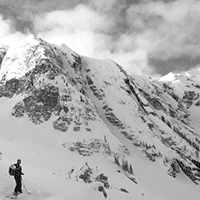Hydration in the Winter
Although drinking enough water is likely the last thing on one's mind on the frigid early morning skintrack, science has repeatedly shown hydration in the winter to be just as, if not more important than during the summer months...Common reasons for an increase include:
1) Breathing colder (and therefore dryer) air, we need to moisten our respiratory tract to protect its integrity - this requires more moisture from the body.
2) Studies have shown athletes sweat only slightly less in the winter months, still losing an average of 1 liter per hour or higher depending on exertion levels.
3) Because the body has to work harder to heat itself when not moving or sweating, carbohydrate requirements go up - and water needs along with it to process extra muscle glycogen.
To make matters worse, the cold temperatures interfere with thirst signals from the brain, meaning even though you don't feel thirsty, your hydration requirements are still nearly as high as if performing the activity in the summer. More in-depth information and citations can be found here. Load up a thermos and drink up!









